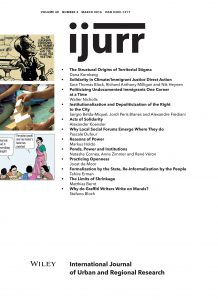10 Writing Tips for Student Sociologists
Good writing is crucial to sociology. For sociology to thrive as a discipline we sociologists have to be able to communicate our research effectively to a range of audiences. There are many great writing guides out there (Write for Research is especially good: https://medium.com/@write4research). This list of tips reflects my experience of writing a sociology PhD. It’s by no means an exhaustive or authoritative list and some readers may disagree with some of its items: nevertheless it reflects three years focussing on trying to improve my own writing. As student advice month draws to a close, I think this list therefore may be useful to some student sociologists.
1) Be assertive: write with an active voice. The passive voice is supposed to suggest scientific objectivity. Sociology is not however an objective, ‘hard’ science such as chemistry that demonstrates ‘facts’. Indeed, there’s a branch of sociology that deconstructs any science’s claims to absolute objectivity (Science and Technology Studies). Sociology is a reflexive discipline. Like ‘hard’ science, we make claims based on rigorous, transparently presented empirical evidence but we also critically evaluate these claims. We ruthlessly examine our position in relation to the research methodology and the analysis that allows us to make such claims. As sociologists we critically examine ourselves in the mirror and then analyse the process of watching itself. Our claims are therefore hard-won. So, as long as you are reflexive, write with an active voice and don’t be afraid to use first person pronouns.
The passive voice can also disconnect your reader from your narrative. For example:
The research cohort was asked to search Google for information about aspartame while the researcher recorded their search terms.
This is more engaging:
I asked my research cohort to search Google for information about aspartame while I recorded their search terms.
2) Pay attention to the length of your sentences and punctuation. You can use grammatical rhythms to control the reader’s attention. If you’ve an important point to make, don’t make it in a long sentence full of connectives: use a short sentence.
3) Only use technical terms if you’ve previously explained what they mean. You don’t have to always explicitly define a word; you can give the reader enough information to infer its meaning. For example:
There are homosexual characters in Game of Thrones. These representations rarely challenge dominant heterosexual norms. Game of Thrones therefore is essentially heteronormative.
4) Be efficient with your language. Think about how you can say something with fewer words. Don’t use redundant phrases such as ‘the fact’.
For instance:
The fact that white working class youth are blamed for their lack of aspirations is problematic.
This is better:
Blaming white working class youth for their lack of aspirations is problematic.
Redundant words are everywhere. For instance:
This is a subject which preoccupied the interviewee.
Is better expressed as:
This subject preoccupied the interviewee.
5) Put statements in a positive form. “Unrepresentative” is better than “not representative of; “unaware” is an improvement on “not knowing”; “he disagreed” is preferable to “he didn’t agree” and so on.
6) Place emphatic words at the end of your sentence. This statement is weak:
While Latour is an influential theorist; he has failed to substantiate many of his arguments.
Compared to this statement:
Latour in an influential theorist; yet many of his arguments remain unsubstantiated.
7) Sign post where you are taking the reader. You should be taking your reader on a guided journey. Never leave your reader wondering if you’re taking them off on an interminable, meaningless tangent. I always try to image what someone reading my work for the first time is thinking and I do my best to manage this hypothetical reader’s expectations.
For example:
Initially, in the following analysis that explores the utility of Introna’s theory it appears I am testing the concept of the filter bubble. It is my intention; however, to investigate how, according to Introna’s framework, technology’s affordances are defined by our skills and competencies.
8) Try to integrate your methods, methodology and theory into a narrative. Long discrete descriptions of research methods with commentaries on each method’s pros and cons result in turgid prose. If, for instance, you’re studying the relationship between social identities and online gaming cultures, you’ll need methods that operationalise these phenomena. In particular, you’ll need a sophisticated methodology that challenges our online/offline cultural dichotomies and you’ll need methods that simultaneously account for online and offline practices. Your methods should be an expression of your sociological imagination: inseparable from your intellectual and practical approach to your research questions.
9) Be disciplined: don’t procrastinate until you feel in the mood to write inspired prose. Inspiration may come as you relax into your writing. If your output is rubbish at least you’ve added to your word count and you’ll have something substantive you can improve when you’re in the zone.
10) Never rest on your laurels. There are always ways to improve your writing that, while on the lookout for tips, you will serendipitously discover. Always consider your writing and your sociological self a work-in-progress.
@huwcdavies






1468-0491/asset/society_affiliation_image.gif?v=1&s=859caf337f44d9bf73120debe8a7ad67751a0209)
1756-2589/asset/NCFR_RGB_small_file.jpg?v=1&s=0570a4c814cd63cfaec3c1e57a93f3eed5886c15)
thanks you you give me good tips